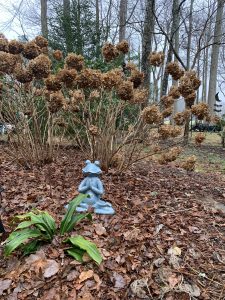By Cindy Hoffman, Staff Writer

Plant litter is a great food source for birds. So leave some leaves in your garden for our feathered friends. CINDY HOFFMAN/BAYSIDE GAZETTE
(Feb. 9, 2023) If you have not cleaned the leaves out of your garden yet, you might want to wait until March, said Kate Patton, executive director of the Lower Shore Land Trust.
Many people and especially homeowners associations, love a neat and tidy yard. Patton believes that is a mind shift people need to work on, because birds and other wildlife love and need a little mess.
“Leaves break down and become the most important fertilizer for the soil,” said Patton. “And stalks with flower heads provide food for birds all winter long.”
Plant litter is a great food source for foraging birds, according to the trust. The insects living in the plant material can help them through the winter. The standing stems offer a great forage site too. Seeds from plants left behind can provide nutrition for over-wintering birds.
“Once you get to early March, you can start your cleanup. But you might find some areas where you can leave the leaves,” said Patton.
One thing people should do now is clean out those nest boxes. Already, blue bird males are looking for nest sites. They won’t use a nest site with last year’s nest in it. And old nests may be inhabited by mites, bees or even mice. By cleaning out that nest box, local blue birds and other species can begin to nest in late March and early April.
For those gardeners who are eager to get their hands in the dirt now, Patton suggests trying winter sowing of cold-hardy plants. Last winter she conducted a little experiment. She recycled some old plastic clamshell food containers into little green houses. She punched holes on the top and filled them with soil and native seeds. She decided to start with cardinal flowers (Lobelia cardinalis), a native flower enjoyed by hummingbirds. Instead of keeping the little greenhouses inside, she put them outside. The process is called cold stratification and works for seeds that need cold to germinate. It can be used for trees, shrubs and perennials. Soon, she saw little seedlings coming up out of the dirt.
This year, she hosted a winter seed-sowing day at the trust’s office in Snow Hill. Her team is testing two containers, the clamshells and pots, to see which works best. Patton hopes this is a project she can scale up. The plants will be sold at the native plant sale May 5-6 and used at the various gardens they tend. “Even though it’s winter, you can still be planting,” Patton said.
The Lower Shore Land Trust has an extensive pollinators program. For those who love to garden, consider participating in the pollinator certification program. Visit their website for more information. www.lowershorelandtrust.org/pollinators.
